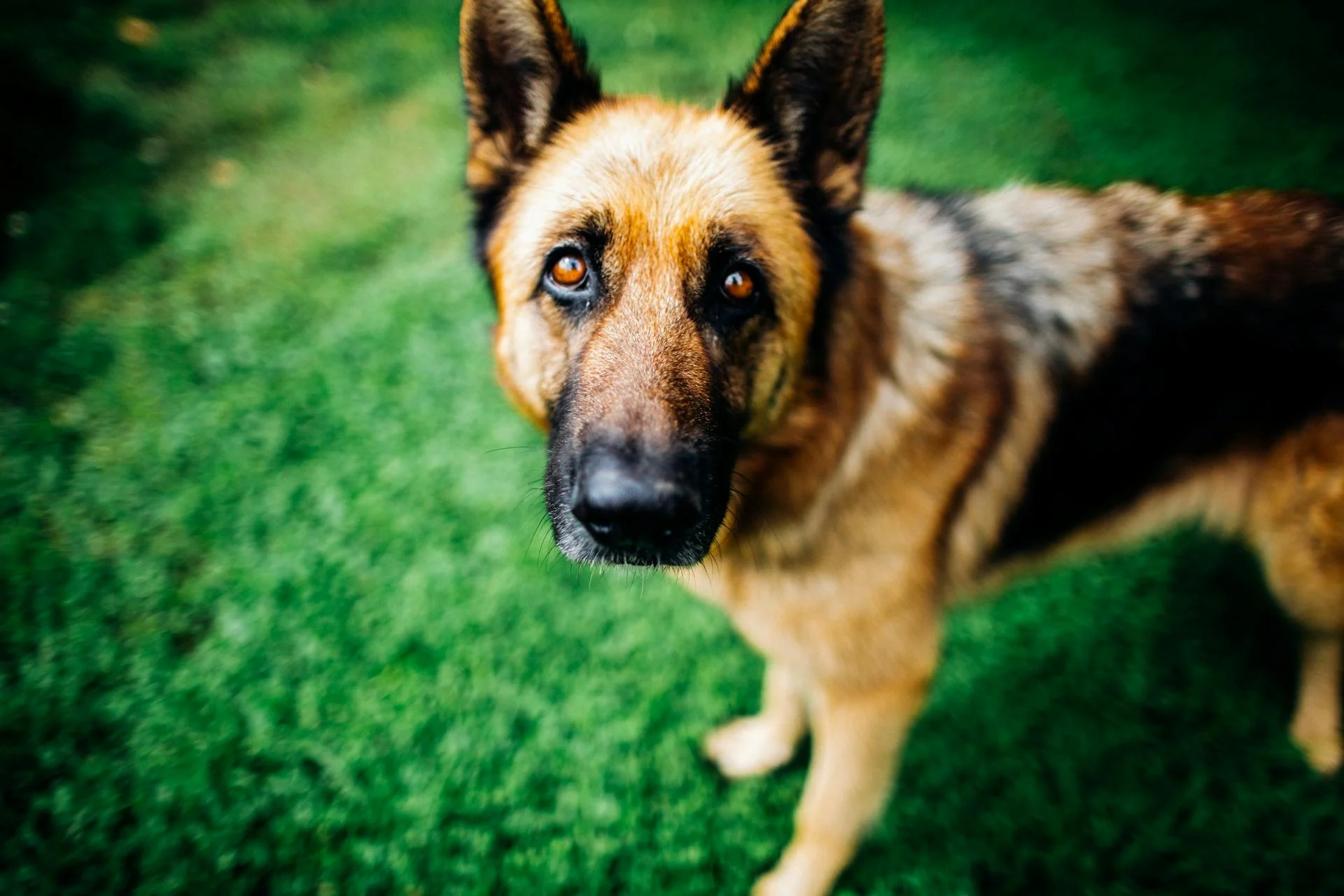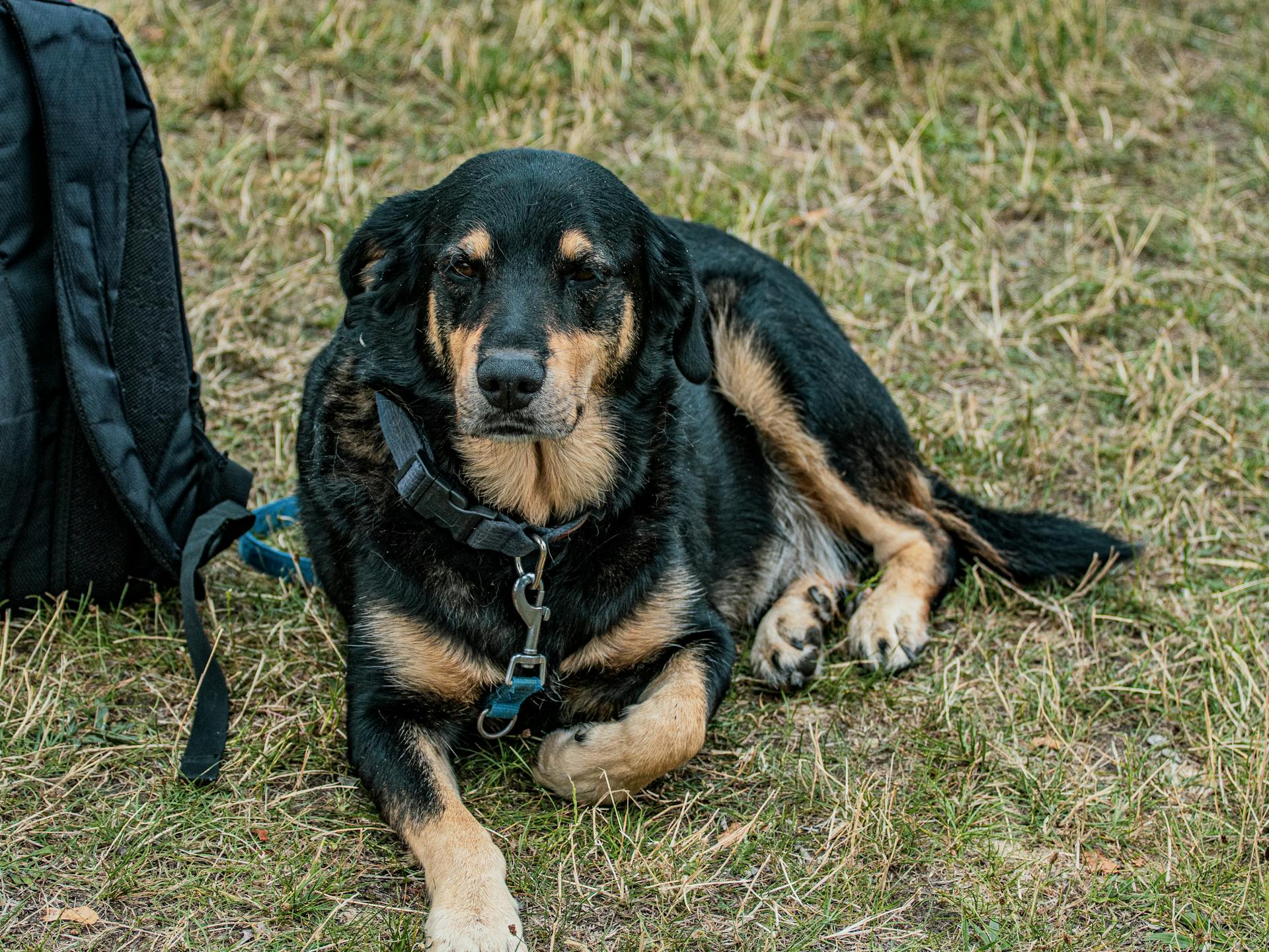
German Shepherds are one of the most beloved breeds in the world, and it's easy to see why. Their intelligence and loyalty make them a popular choice as both family pets and working dogs.
Their origins date back to the late 1800s in Germany, where they were bred to herd sheep. This is where they got their name - "German Shepherd" is a direct translation of the German phrase "Deutscher Schäferhund".
German Shepherds are known for their high energy levels and need regular exercise to stay happy and healthy. A daily walk or run is a must for these dogs.
Their intelligence and trainability make them a popular choice for police and military work, as well as search and rescue missions.
History of the Breed
The German Shepherd breed has a rich history that dates back to the late 19th century. Captain Max von Stephanitz, a German cavalry officer, is credited with standardizing the breed in 1889.
Recommended read: Most Common Mixed Breed Dogs
A dog named Hektor Linksrhein, a medium-sized yellow-and-gray wolflike dog, caught von Stephanitz's attention at a dog show in Karlsruhe, Germany. He was impressed by the dog's primal canine type, power, endurance, and intelligence.
In 1899, von Stephanitz began breeding a variety of herding dog types in his quest to develop a breed with the character, endurance, and mental stability to serve humans. The German Shepherd was later introduced to America in 1907, where it quickly gained popularity.
A Brief History of the Breed
Captain Max von Stephanitz is credited with standardizing the German Shepherd breed, starting in 1889. He was particularly drawn to a dog named Hektor Linksrhein, who was a working sheepherder with impressive qualities.
In 1899, von Stephanitz began breeding a variety of herding dog types to develop a breed with the character, endurance, and mental stability to serve humans. He was an officer in the German cavalry at the time.
The German Shepherd was introduced to America in 1907, at an open class dog show in Newcastle, Pennsylvania. Mira von Offingen, imported by Otto Gross, was one of the first German Shepherds shown in America.
By 1913, the German Shepherd had won its first championship, and the German Shepherd Dog Club of America was founded that same year.
Intriguing read: Are German Shepherds Good for First Time Owners
Popularity After WWI
After World War I, the German Shepherd breed experienced a surge in popularity. The German Army's use of the breed as war dogs caught the attention of the general public.
Tales of the breed's intelligence and striking appearance, told by returning U.S. fighting men, contributed to its rising popularity.
The breed's popularity was further boosted by the movies of Rin-Tin-Tin and Strongheart, which played on the "boy and his dog" theme.
However, this increased demand led to a proliferation of puppy factories producing poor-quality "German police dogs." This resulted in a downturn in the breed's popularity.
Despite this, serious breeding continued, as exemplified by Mrs. Harrison Eustis of Fortunate Fields Kennels in Switzerland.
Temperament and Characteristics
German Shepherds are playful and energetic, making them great companions for children and the elderly. They're also devoted, vigilant, and protective family members.
Their intelligence is well-known, but they still need training and guidance to channel their protective tendencies. Without a firm hand and clear guidance, they can become dominant.
German Shepherds are highly trainable, but they can be overly aggressive if not corrected with training. They'll bark in response to perceived threats, but they're not overly noisy or excitable.
In fact, they're capable of performing serious jobs like working with the military or police. They're also known for their loud bark, so consider your neighbors' tolerance for noise.
German Shepherds need ample daily exercise, more than just a daily walk. They require upwards of two hours of exercise per day, making a yard with space to run freely ideal.
The Breed
The German Shepherd breed was founded by Captain Max von Stephanitz in 1889 after he purchased a dog named Hektor Linksrhein, which he renamed Horand von Grafrath.
This dog was a medium-sized, yellow-and-gray wolflike dog with exceptional endurance, steadiness, and intelligence, making it a perfect candidate for breeding.
The breed was developed to be a working sheepherder, requiring minimal training beyond direction and finish to become proficient at the task.
The German Shepherd was introduced to America in 1907 at an open class dog show in Newcastle, Pennsylvania, and by 1913, it had won its first championship.
The breed is known for its gracefully curved outline and easy natural gait, making it a standout among other breeds.
As the American Kennel Club (AKC) describes, the German Shepherd is "dogkind's finest all-purpose worker", thanks to its exceptional intelligence and ability to learn numerous commands.
The breed's intelligence is unmatched, with some saying it's as smart or even smarter than virtually any other breed.
Frequently Asked Questions
What are German shepherds mainly used for?
German Shepherds were originally bred for herding sheep, but their versatility has led to their use in various roles such as assistance, search-and-rescue, and police work. They are highly trainable and adaptable dogs.
What are three interesting facts about German shepherds?
Here are three interesting facts about German Shepherds: They are one of the smartest dog breeds, gained fame during World War I, and have a long history of being popular in America.
Sources
- https://www.dogtrainercollege.us/a-very-brief-history-of-the-german-shepherd-dog/
- https://mistyridge.com/german-shepherd-history-a-fascinating-look-into-the-breeds-origins/
- https://www.gsdca.org/breed-history/
- https://www.britannica.com/animal/German-shepherd
- https://vetericyn.com/blog/dog-breed-guide-the-german-shepherd/
Featured Images: pexels.com


